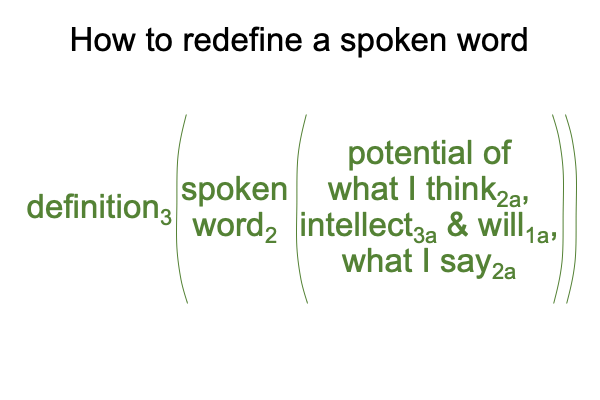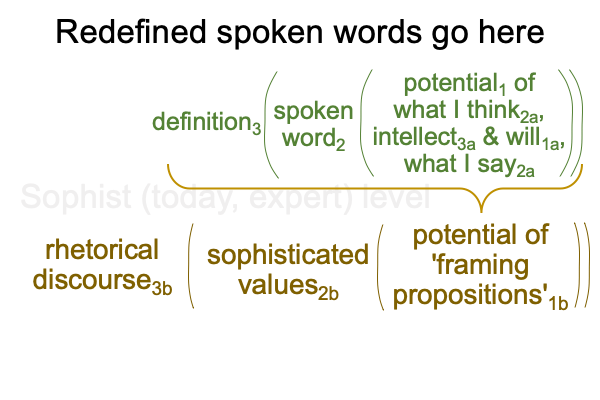0791 Okay, spoken words are supposed to convey reality and facilitate common understanding.
Reality and understanding are two perfections of the spoken word.
And, these two perfections have been put on pause.
0792 One lesson is clear.
If what I say corresponds to what I think, then the perfection of spoken words point to the content level of the sophist’s interscope, as a location for reality and understanding.
0793 But, what about abusing these perfections through something that corresponds to perfectionism?
Ah, if the perfectionism of spoken words associates to sophisticated values2b, then that perfectionism is facilitated by the potential to ‘frame propositions’1b as well as the potential of ‘formalizing knowledge’1b.
0794 So, I wonder, how would rhetorical discourse3b virtually situate reason3a,1a in a fashion that accords to refined reason3c?
0795 I have a suggestion.
Let me start with how to define a spoken word.

Does this nested form provide the appearance of reality for rhetorical discourse?
0796 Note how the content-level of the interscope for the ancient Greek reasoning one1c is repackaged into the above nested form.
What I say2a is the spoken word2 and the very act of speaking associates to a message as an actuality2 and as a potential1.
What I think goes with definition3 and touches base with the potential of meaning1.
The intellect3a contextualizing the will1a goes with presence, which (in the above figure) only stands in the realm of possibility.
Ambiguities concerning whose intellect and whose will capture the attention of the inquirer.
There are many ways to resolve these ambiguities.
For example, a written English dictionary presumes that the presence (of an authority’s reason3a,1a) is substantial enough to inscribe the definition3 of a spoken word2 onto a page, in indelible ink1.
0797 Now, I can bring in the situation level.
If I associate the potentials1 underlying the definition3 of spoken words2 with elements of the nested form on the citizen level, then I can co-opt the elements that correspond to the citizen, but not the elements that correspond to a sophist’s participation on the citizen’s level.
For the citizen, meaning1 underlies a spoken word2. Meaning is what I think2a.
For the sophist, what I propose (is the meaning)1 underlies a spoken word2.
For the citizen, message1 underlies a spoken word2. Message is what I say2a.
For the sophist, what I proclaim (is the message)1 underlies a spoken word2.
For the citizen, presence1 underlies a spoken word2. That presence1 is my intellect3a and my will1a.
For the sophist, the intellect3a characterizes whether one particular word2 is used or not. The presence of one particular word as opposed to another particular word may be crucial to victory1a. This selection corresponds to the machinations of the intellect3a, directly, and the victorious will1a... er… the will1a, indirectly.
0798 Now, I may reconfigure the category-based nested form for definition into a style where the “I” becomes more ambiguous. The citizen may think that “I” is me”. But, the sophist is confident that “I” is “we”, the ones who are participating in the forum.
Here is a diagram of the reconfigured definition.

0799 Technically, what I say2a no longer associates with the spoken word2, it2a only goes with the potential of message1.
Also, what I think2a no longer associates with definition3, it2a only goes with the potential of meaning1.
0800 So, theoretically, while the potential of meaning presence and message associates to the all three elements of the citizen-level nested form, this reconfigured definition no longer implies that what I say2a entails both actuality2 (of spoken words2) and potential1 (of message1) and that what I think2a entails both normal context3 (of definition3) and potential1(of meaning1).
Practically, the potential of framing propositions1b and formalizing knowledge1b packages the entire contenta-level of the citizen interscope. It1b does so through definition3. The normal context of definition3 brings the actuality of spoken words2 into relation with the possibilities of meaning, presence and message1. Yes, that entire nested form goes into the situationb-level potential1.
0801 Here is a picture.

